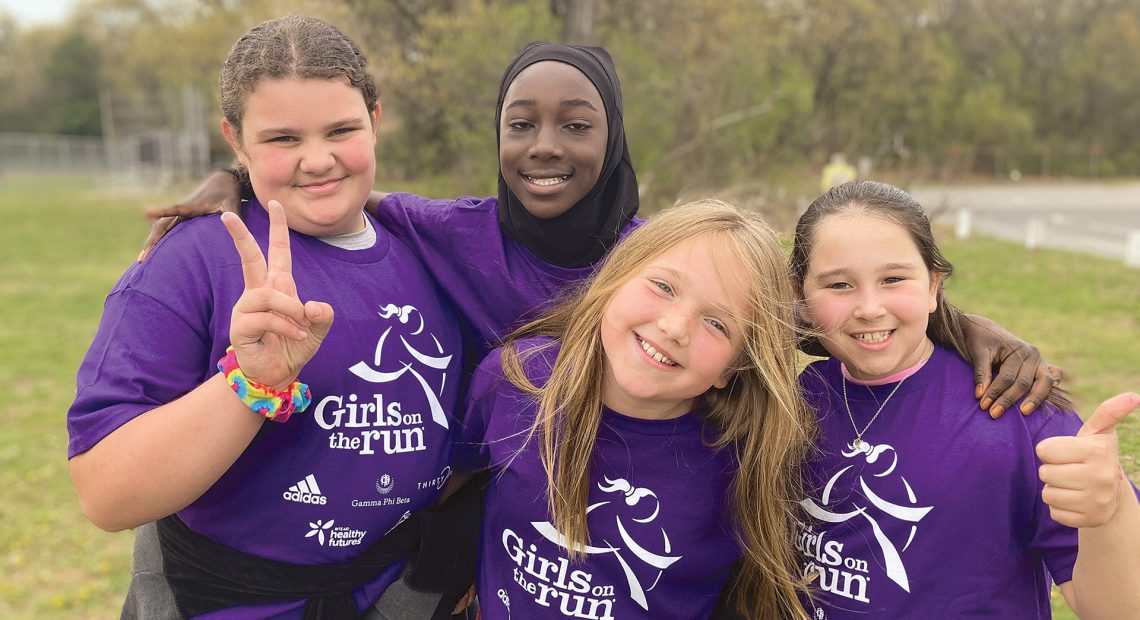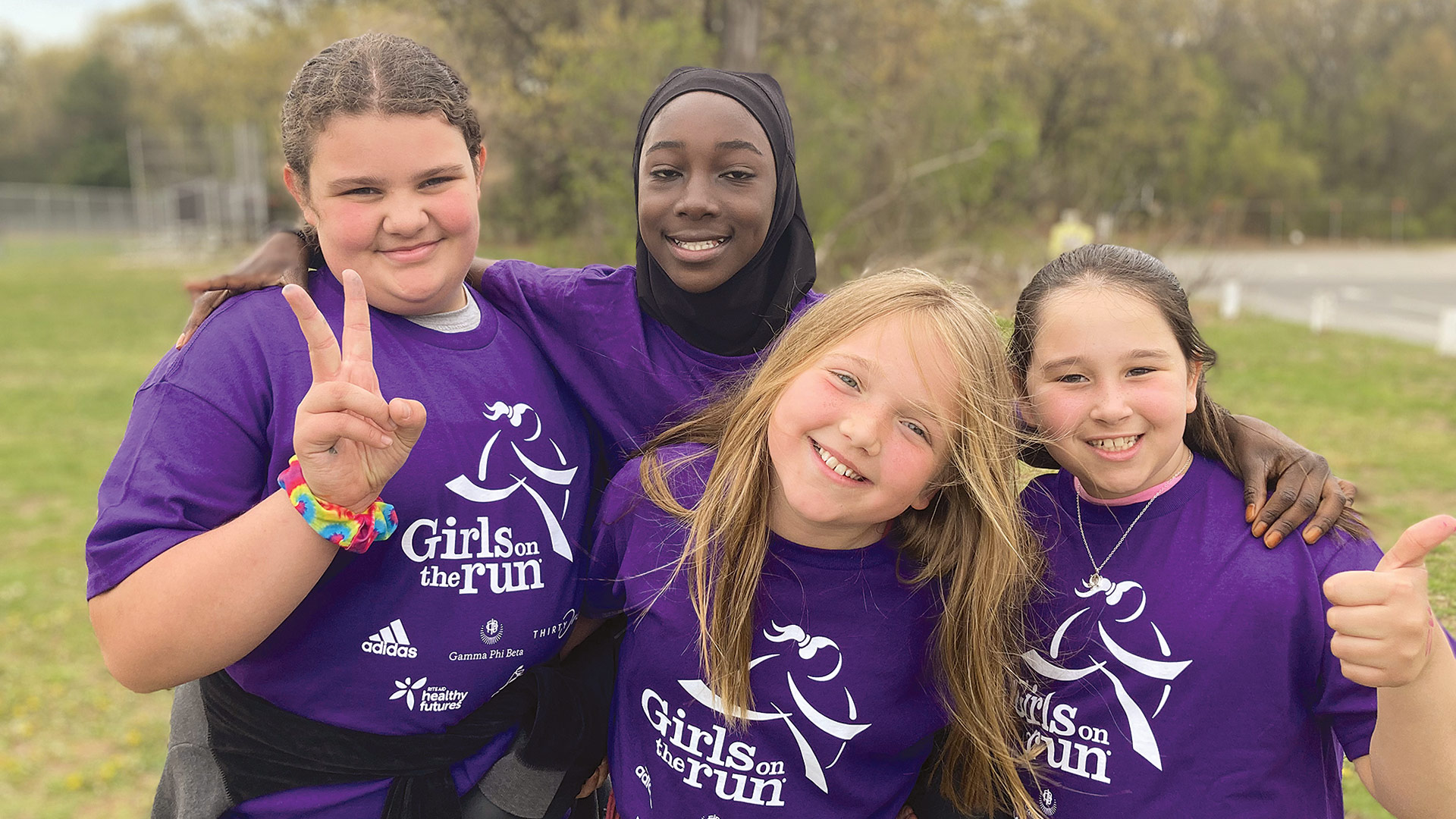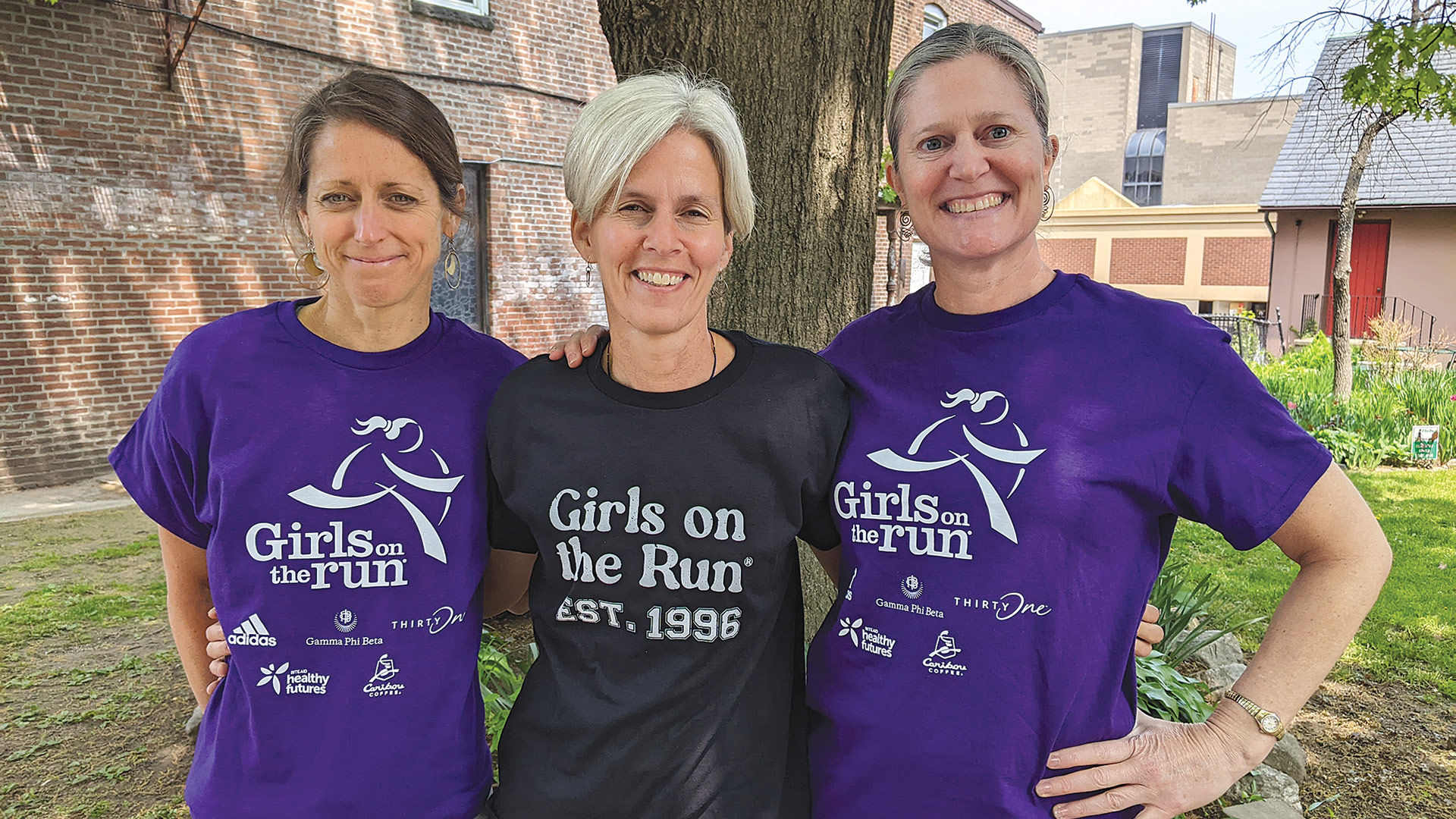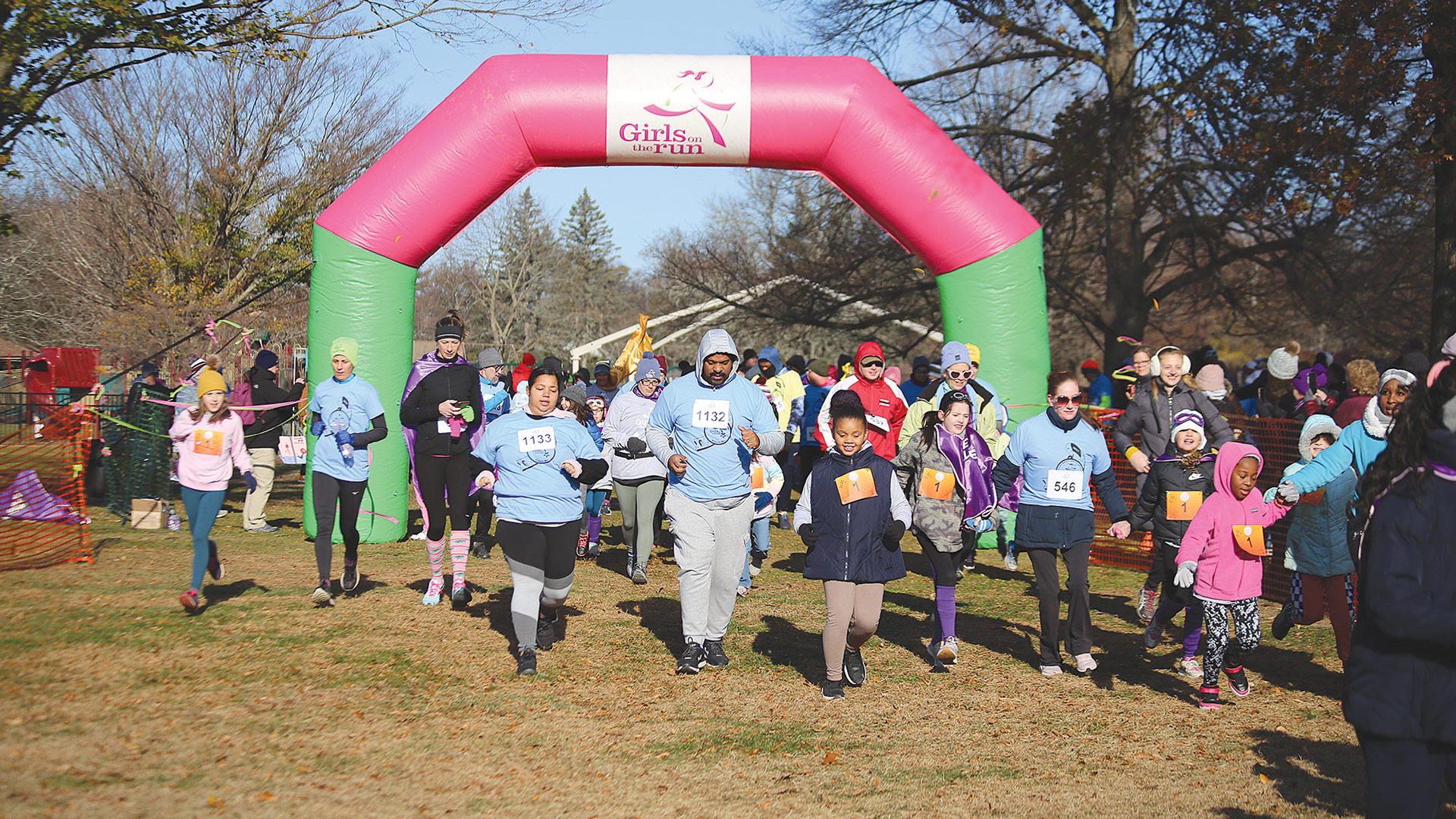
At Girls on the Run, Everyone Has a Winning Time
Confidence Games

Alison Berman recalls a girl who finished her first 5K with Girls on the Run last year.
“This was a girl who had never even walked three miles, which is true for many of our kids. And it took her two hours. I mean, everything was being packed up, and when she finished, it was the most moving thing when she came across that finish line. Her aunt was crying. It was just … something that she never thought that she could possibly do.”
That, in a nutshell, is why Girls on the Run (GOTR) really isn’t about running — at least, not in the sense that competitive runners think about a 5K.
“You have the kid who can do it in 20 minutes and the kid who can do it in two hours,” said Berman, council director of Girls on the Run Western Massachusetts. “It’s not timed. They keep their own goals.”
So, if running isn’t the main focus, what is Girls on the Run about?
In a nutshell, it’s a physical activity-based, positive youth-development program that uses running games and dynamic discussions to teach life skills to girls in grades 3-8. During the 10-week program each semester, girls participate in lessons that foster confidence, build peer connections, and encourage community service while they prepare for a celebratory, end-of-season 5K event.
“The goal, really, is for them to increase their confidence and be able to achieve something they haven’t achieved before.”
Berman explained that each session features a social-emotional life-skills lesson drawn from a nationally distributed curriculum. “There are lessons on how to stand up for yourself, lessons on choosing friends, lessons on identifying and expressing emotions, on stopping to take a breather, empathy, gratitude.”
Meanwhile, each team — there are 75 of them in the Western Mass. council — tackles a community-impact project to give back to their community, Berman explained.
“They could write letters to children’s hospitals, or they can make things for animal shelters. We have one school in Chicopee that did a project in their girls’ bathroom because it was so gross; they made all these amazing signs for it.
“And then, all the while, they’re also training to run a 5K,” she went on. “But running is really secondary to the social-emotional part of it. They can run, they can walk, but the goal, really, is for them to increase their confidence and be able to achieve something they haven’t achieved before.”
The Western Mass. council of GOTR launched in 2015 with 90 girls on six teams. Now, the chapter boasts 75 different teams — 1,030 girls in all — and 285 volunteer coaches. Molly Hoyt, the nonprofit’s program director, started out as a coach herself and can speak to why these women — about half of them teachers by trade — volunteer.
“I think it touches the heart of a lot of people, thinking about themselves at that age and what they needed and probably could have benefited from and didn’t have. So I think they’re filling a gap, and they want to give back” she explained. “And I think teachers see a lack of social and emotional learning in schools. The days are so busy. So it’s a way to give this kind of education to some kids.

From left, Molly Hoyt, Alison Berman, and Coleen Ryan say Girls on the Run changes not only the participants’ lives, but often the culture of their schools.
“They also learn stuff from this,” Hoyt went on. “I think the reason we have coaches come back season after season is because they are also benefiting from it. I love coaching. I feel like I learned a lot from it. And there are lessons that are really great at any age; they work for all the coaches too.”
Keeping on Track
The end of the fall and spring seasons end with a 5K celebration, with the spring event typically being the larger of the two. That will take place on Saturday, June 3 at Western New England University, where about 4,000 runners, families, coaches, and supporters are expected to gather.
Registration opens at 8:30 a.m., fun events get underway at 9:30, a group warmup begins at 10, and the walk/run steps off at 10:30. The registration cost is $30 for adults and $10 for youth and includes an event shirt. Volunteers are still welcome to sign up. For more information about the event, how to register, and volunteer opportunities, visit www.girlsontherunwesternma.org.
“We have families come with coolers and lawn chairs and signs, and they set up like they’re tailgating,” Hoyt said. “It’s really fun. It’s a very special day … it’s very unifying. They feel like they’re part of something bigger.”
“It’s a group of girls around the same age going through the same things together. And when you put caring adults with them, it kind of holds them in this vessel and allows them to take risks and lean in a little bit and have these discussions.”
She emphasized that the 5K, like other GOTR activities, is not about achieving a time, but about personal growth.
“I feel like this redefines what running means to them. I think that a lot of kids think, if they’re a runner, it means they have to run marathons or win races. Here, they start understanding that anyone can be a runner because it’s super individual, and what you get out of it is what you want.”
Hoyt said her daughter took part in the program and had never been a runner, and now she runs cross country at school.
“We hear that from a lot of kids; they just did the program and really weren’t into the running piece while they were doing Girls on the Run, but discovered that actually they can do it if they want to. So I do think it redefines the whole concept of being physically active and what running is.”
Coleen Ryan, program manager at GOTR Western Massachusetts, added that, once girls develop a love for running, they find it’s an always-available pastime. “Running doesn’t cost money. Anybody can go out their door and run and be successful.”
She added that the groups at each session are kept to a healthy coach-to-child ratio, so when they’re having discussions or doing laps, they get a lot of individualized attention. “That makes a difference.”
While the girls’ personal growth is exciting, Berman said, perhaps even moreso is the impact of those changes on their families and schools.
“A lot of our coaches who are teachers tell us that they see the kids using the curriculum in the classroom, and they’re becoming leaders in school, like standing up for their friends. So we see the impact at a community level as well. We’ve had some of our teachers, coaches, and principals talk about how it’s also changed the culture of their school and how it’s even gotten guardians and parents more involved.”

The end-of-semester 5K events are always celebratory, not competitive.
And it’s not only the girls who are internalizing lessons and deploying them outside of Girls on the Run, Hoyt said — so are the coaches.
“The nice thing about coaching as a parent or a teacher is that you are learning the same language that the girls are during practice, so you can really support them, at home with your own child or in the classroom with kids in the program. You have that common language and start the lessons from the same page. I think it allows adults to support kids better when they go through the experience with them.”
Mission Accomplished
As one girl stated in a video created by GOTR Western Massachusetts, “one thing I love about Girls on the Run is that it’s about body positivity and showing that I’m who I am.”
It’s a message, among many others, that has caught on over the years. The national Girls on the Run organization was formed in 1996 and has since reached more than 2 million girls, with at least one council in every state; three call Massachusetts home.
GOTR claims to make a stronger impact than organized sports and physical-education programs in teaching life skills such as managing emotions, resolving conflict, helping others, and making intentional decisions. There are separate curricula for grades 3-5 and 6-8, so the lessons are age-appropriate. And the girls keep journals to track their personal goals and progress.
“That progress is what’s important,” Hoyt said. “It’s not really about how fast anyone is or how far anyone’s running, but that they’re making individual progress.”
That sense of personal growth — Girls on the Run describes itself as developing joyful, healthy, and confident girls — is an attractive quality when so many negative factors are weighing on kids’ mental health these days, Berman said.
“We’ve definitely tapped into a need. There’s a huge child mental-health crisis right now. And whatever’s going on with them, Girls on the Run is giving them this extra layer of skills to support them. And it’s not just the lessons, but having these caring adults that are outside of their school and their parents, who are hopefully building up their resilience.”
Hoyt agreed. “It’s a group of girls around the same age going through the same things together. And when you put caring adults with them, it kind of holds them in this vessel and allows them to take risks and lean in a little bit and have these discussions.”
Berman emphasized that the coaches aren’t trained in running; instead, they’re skilled in the truly important things. “They’re more trained in how to hold a group of kids and how to facilitate discussions and be aware of some mental-health stuff that might come up — because, obviously, there’s a lot of behavioral stuff that comes up in the groups as well. And they have to know how to handle that.”
Because of the importance of the program, Berman said 65% of participants are on full or partial scholarships, which defrays the $160 cost based on ability to pay. “We don’t turn anybody away for financial need. And we also provide shoes for anybody that doesn’t have shoes. We also provide a snack for everybody.”
GOTR relies on fundraising to support its work, including grants and business sponsorships, to help pay for not only the 10-week program twice a year, but also, starting this July, an annual week-long summer camp in Chicopee.
But before that is the not-so-small matter of hosting 4,000 people at Western New England University on June 3 for the region’s most celebratory 5K.
“Normally you might be cheering someone on to win,” Ryan said, “but this is just like, ‘you did it. Everybody, you did it!’”





